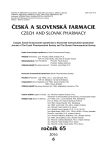-
Medical journals
- Career
Influence of drug concentration and blending technology on the content uniformity of mixture for low dose warfarin tablets
Authors: Jan Elbl; Jan Muselík; Aleš Franc; Jana Mikušová; Zuzana Dolejší; David Vetchý
Authors‘ workplace: Veterinární a farmaceutická univerzita Brno ; Ústav technologie léků, Farmaceutická fakulta
Published in: Čes. slov. Farm., 2016; 65, 211-215
Category: Original Articles
Overview
Warfarin is a drug with narrow therapeutic index. Individualization of dose and thorough therapy monitoring is compensated by long time use in praxis and low therapy cost. Considering the low dose usually administered, critical parameter of solid dosage form is its uniformity of content. It has to not only meet the criteria set by pharmacopoeia, but to meet them on statisticall significant level also.
This experimental study asseses impact of warfarin concentration and blending time after adition of lubricant on uniformity of content of mixtures and tablets made of them. It concludes, that concentration in 2–2,7% range is optimal and its increase or decrease has a negative effect on uniformity of content. It also confirms 5 minutes of blending after lubricant addition to be adequate, as employing longer blending times leads to mixture overblending.Key words:
content uniformity • warfarin • blending time • narrow therapeutic index
Sources
1. Wardrop D., Keeling D. The story of the discovery of heparin and warfarin. Brit. J. Haem. 2008; 141, 757–763.
2. Cundiff D. K. Insufficient evidence supporting low-intensity warfarin for venous thromboembolism prophylaxis. Med. Gen. Med. 2003; 5(3), 2.
3. Lawren M. V., Zhanel G. Z. Clinical significance of bioequivalence and interchangeability of narrow therapeutic range drugs: focus on warfarins. J. Pharm. Pharmaceut. Sci. 1998; 3, 92–94.
4. Jaffer A., Bragg L. Practical tips for warfarin dosing and monitoring. Clev. Clin. J. Med. 2003; 70, 361–371.
5. Warfarin sodium antitrust litigation. United states court of appeals for the third circuit. http://www2.ca3.uscourts.gov/opinarch/ 023603p.pdf (21. 11. 2016).
6. Sawoniak A. E., Shalansky A. F., Zed P. J., Sundreji R. Formulary considerations related to warfarin interchangeability. Can. J. Hosp. Pharm. 2002; 55, 215–218.
7. Franc A., Muselík J. Způsob přípravy pevné lékové formy se sodnou solí warfarinu ve formě klatrátu izopropanolu. VFU Brno. Patent CZ304136 (2. 10. 2013).
8. Muselík J., Franc A., Doležel P., Goněc R., Krondlová A., Lukášová I. Influence of process parameters on content uniformity of a low dose active pharmaceutical ingredient in a tablet formulation according to GMP. Acta Pharm. 2014; 64, 355–367.
9. Muselík J., Franc A., Štarková J., Matějková Z. Optimalizace technologických postupů pro přípravu tablet s nízkým obsahem warfarinu metodou přímého lisování. Čes. slov. Farm. 2014; 63, 217–221.
10. Franc A., Muselík J., Máslová R., Hadrabová J. Obsahová stejnoměrnost směsí a tablet obsahujících warfarin. Čes. slov. Farm. 2013; 62, 177–181.
Labels
Pharmacy Clinical pharmacology
Article was published inCzech and Slovak Pharmacy

2016 Issue 6-
All articles in this issue
- Influence of drug concentration and blending technology on the content uniformity of mixture for low dose warfarin tablets
- Effect of EUDRAGIT® RS on the release behaviour of theophylline solid dispersions
- Level of understanding of medical terms among italian students
- Fractal aspects of the flow and shear behaviour of free-flowable particle size fractions of pharmaceutical directly compressible excipient sorbitol
- Czech and Slovak Pharmacy
- Journal archive
- Current issue
- Online only
- About the journal
Most read in this issue- Influence of drug concentration and blending technology on the content uniformity of mixture for low dose warfarin tablets
- Fractal aspects of the flow and shear behaviour of free-flowable particle size fractions of pharmaceutical directly compressible excipient sorbitol
- Effect of EUDRAGIT® RS on the release behaviour of theophylline solid dispersions
- Level of understanding of medical terms among italian students
Login#ADS_BOTTOM_SCRIPTS#Forgotten passwordEnter the email address that you registered with. We will send you instructions on how to set a new password.
- Career

